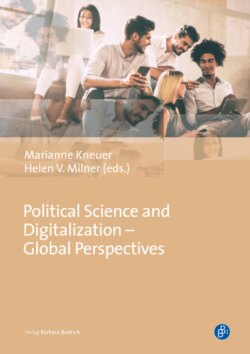Читать книгу Political Science and Digitalization - Global Perspectives - Группа авторов - Страница 27
На сайте Литреса книга снята с продажи.
[42] Digitalization and Political Science in Mexico Rodrigo Sandoval Almazán 1 Introduction
ОглавлениеDigital revolution is changing all fields of human interaction. The educational field is not the exception, on the contrary, it is one of the most important and complex changes with a fast evolution and impact on students, academics and all of the society. Also, the political sciences field receives different impacts from the digital revolution, most of them unknown at this point. The purpose of this chapter is to unveil two of these impacts on the education of political sciences: teaching and research. The first part of this chapter focuses on understanding the impact of teaching political science in the Mexican context. The second part will discuss the impact of research on this field. These seminal ideas are the result of the discussion panel held during the IPSA conference in Hannover, Germany in December 2017. I hope this will help introduce the discussion of political science in Mexico and the rest of the world.
Digital revolution plays an outstanding role in nowadays teaching on political science. Teachers in many countries changed green boards with chalk for flat TV screens, DVD players, laptops and digital boards that send written information to a computer monitor instantly. However, this hardware evolution has not updated the content of lectures and presentation by professors. This change is just at a very early stage.
On the other hand, some students evolve quickly, they criticize contents, ideas, reformulate phrases and place questions beyond the readings, and other students are more passive and copy-paste notes, answer to minimal content and learn on the surface of knowledge. They only read headlines and subtitles of texts but do not understand the meaning of words or phrases. However, both types of students are aware that information is something easy to obtain, it is already on the Internet. Even worse, they do not understand the background concepts or the origins of ideas. It is just enough memorizing headlines to demonstrate some kind of wisdom. On the other hand, senior professors have difficulties adapting to this evolution. They prefer to go slowly, not using technology and avoiding easy knowledge. They would like to use the same old text books and printed papers, and it is difficult promoting a change in their habits and behavior for this new era.
According to the ANUIES’ study “Current status of information technologies in higher education institutions in Mexico”, the Mexican HEI’s reported that 2 % of them allow access to 80,000 students to their learning platform, and 42 % answered that less than 1,000 students used the platform (Ponce Lopez 2016, 60). Those elements show the differences between universities and the challenges they face to promote digital education among their students.
[43] An important disclaimer is the lack of data and studies focused on assessing political sciences’ education in Mexico. Some scholars, Reveles (2016) and Loaeza (2005), did research on the discipline evolution and history over the past two decades. However, data about teaching strategies or the specific use of digital tools on the field are rare or scarce. This chapter intends to present as much information as possible from different official sources in order to build a consistent overview of the problem.
This chapter explores the impact of digitalization in education in political sciences considering the three main actors: teachers, students, and digital development. How does technology affect teaching in social sciences? How do students learn in this new environment? What are the roles professors have to change in order to adapt their lectures and management of subjects? This first section focuses on the Mexican context of teaching social sciences. It is divided into four sections: basic information about digital revolution; aspects of content; institutional aspects and a final section which presents some desiderata, positive perspectives and possible risks. The second section of the chapter will focus on research on political science and the impact of the digital revolution. It will be organized in the same way: general information; aspects of content, institutional aspects and the final section of desiderata.
